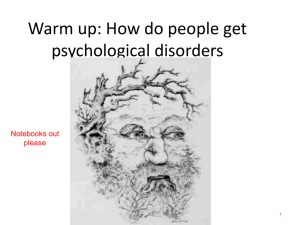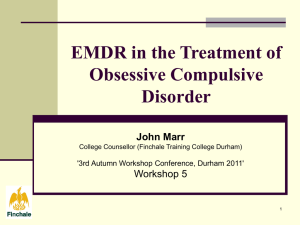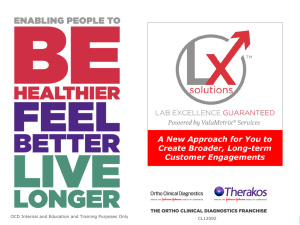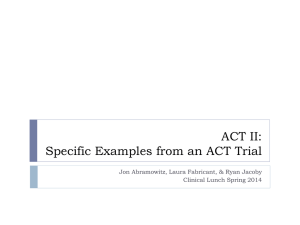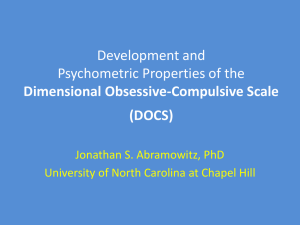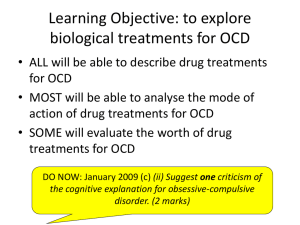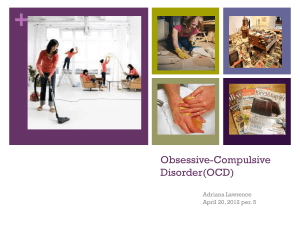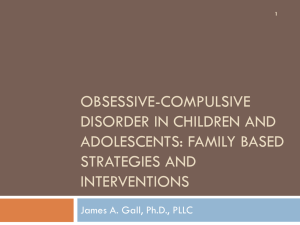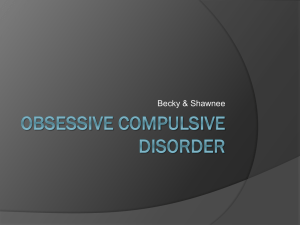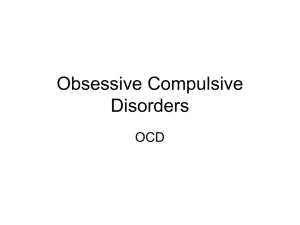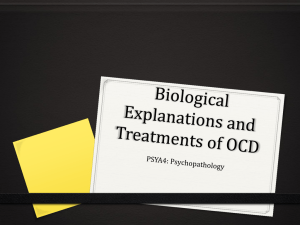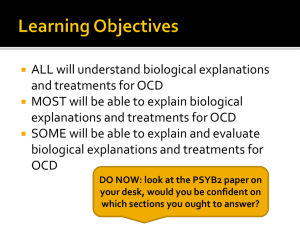My Experience with OCD
advertisement
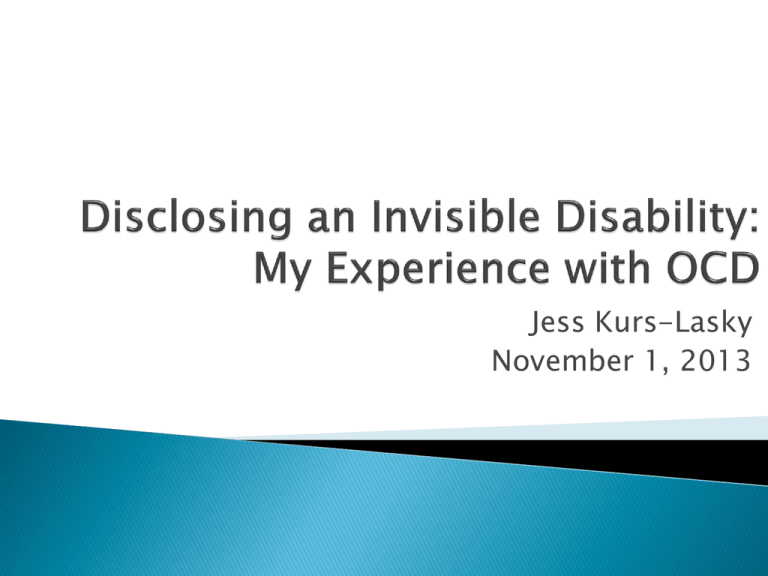
Jess Kurs-Lasky November 1, 2013 December 22, 2005: MTV’s “True Life: I Have OCD” aired Diagnosis of OCD suggested April 2009 Officially diagnosed with OCD in the winter of 2010 (freshman year of college) ◦ Hindsight is 20/20 Attended my first ever IOCDF Conference, July 18-21, 2013 “When disabilities are visible, others are more likely to readily accept that there is a problem that needs to be taken into account. On the other hand, when culturally accepted markers for disability are missing, the problem for the invisibly disabled becomes one of presentation of self” (Stone 295). ◦ Source of shame ◦ Lack “legitimacy” (unlike visible disability) Important to recognize Not always easy to detect Severe cases ◦ Disclosure could be path to success ◦ Interfere with daily life ◦ Can be debilitating Ability to live in the moment Ability to trust myself Peace ◦ “Everything is made unknown and unsafe” (Wortmann 10). Energy Ease of daily tasks (e.g. laundry) Described own behavior as “quirky” ◦ At first, this seemed easier / better My compulsions: mostly unobservable to the untrained-eye Denial ◦ Even to professionals, I denied suffering from OCD ◦ “While unmistakable in retrospect, at the time my symptoms resisted easy diagnosis” (Wortmann 31). “This is how the disorder perpetuates itself: by occasionally rewarding trauma and neurosis with brief moments of relief. Every so often, everything will work, and you will somehow convince yourself that you are safe, and the disorder will claim credit” (Wortmann 34). Weigh pros/cons 5 Ws, 1 H (who, what, where, when, why, how) “Explanations not excuses” (Katie, speaker at IOCDF Conference) Distinction between “helping” and “enabling” (Liz, speaker at IOCDF Conference) Purely a choice (when invisible disability) Difficult when disability is a mental illness ◦ Stigma associated Misunderstanding Myths about OCD Assumptions regarding OCD, invisible disability, and mental illness Common feelings around disclosure ◦ Shame ◦ Guilt ◦ Inadequacy Interference can be confused for laziness, apathy Constant process, constant decision Framework suggested by Wright ◦ “coping versus succumbing” (Dunn and Burcaw 4). “No matter how unlikely a feared consequence, if there exists even the fraction of a percent of a possibility that it could occur, the disorder is able to find purchase” (Wortmann 10). “OCD insinuates itself delicately until you are utterly constrained, until every moment of existence is a choice between submission to the rule of an absurd tyrant and absolute terror” (Wortmann 11). Black-and-white thinking (often associated with perfectionism characteristics), i.e., regarding school assignments Avoidance of high-anxiety situations / people ◦ Note difference between high-anxiety and high-risk “Easy” tasks are harder to begin, harder to complete, and take longer than they would for the *neurotypical person Avoidance re: disclosure ◦ *term used by a professor of mine upon my disclosure of suffering from OCD in the spring 2013, rather than using the word “normal” Willingness to go toward high-anxiety situations / people Disclosure (especially in academic setting) Enjoyment from things such as reading Engaging in “easy” tasks A person’s “best” looks different every day Progress not perfection Comparison to neurotypical people will not help ◦ Usually will hurt OCD as a “chronic” condition Celebrate the “small” victories Not fighting my OCD is essentially egging it on ◦ “As you accept its reasoning, as you begin to work with it, it tightens its hold on you” (Wortmann 11). Strength in numbers My journey toward radical acceptance Bring the concept of disability into a specific, individual context Disclosure: path to success? “One part of my OCD is wrapped up in the really terrible, ominous feeling of being wrong. What if I’m wrong and I don’t have OCD? I feel like a hamster in a hamster wheel, trying to scour my mind for evidence that can reassure me. I finally settle on knowing that I have been officially diagnosed with OCD and so it has to be true. But aren’t psychiatric diagnoses based on subjective assessment? What if I’m remembering incorrectly and reporting false information?” (J. Kurs-Lasky, Abstract “Disclosing an Invisible Disability: My Experience with OCD, A Narrative” 2013) Dunn, Dana S., and Shane Burcaw. "Disability Identity: Exploring Narrative Accounts of Disability." Rehabilitation Psychology (2013): 1-10. PsycINFO. Web. Grayson, Jonathan B. The GOAL Handbook: Running A Successful Support Group For ObsessiveCompulsive Disorder. Publication. Philadelphia: Anxiety and OCD Treatment Center of Philadelphia, n.d. The GOAL Handbook: Running A Successful Support Group For Obsessive-Compulsive Disorder. International OCD Foundation. Web. Hatzenbuehler, Mark L., Jo C. Phelan, and Bruce G. Link. "Framing Health Matters: Stigma as a Fundamental Cause of Population Health Inequalities." American Journal of Public Health 103.5 (2013): 813-21. May 2013. Web. McIngvale, Elizabeth. "Conquering School & Your OCD: Tips and Tricks for High School, College, and Graduate School." International OCD Foundation: 20th Annual OCD Conference. Hyatt Regency Atlanta, Atlanta. 19 July 2013. Speech. Murphy, Terry W., Edward E. Zine, and Michael A. Jenike. Life in Rewind: The Story of a Young, Courageous Man Who Persevered over OCD and the Harvard Doctor Who Broke All the Rules to Help Him. New York: William Morrow, 2009. Print. Stone, Sharon D. "Reactions to Invisible Disability: The Experiences of Young Women Survivors of Hemorrhagic Stroke." Disability and Rehabilitation: An International, Multidisciplinary Journal 27.6 (2005): 293-304. PsycINFO. Web. Strang, Katie. "Conquering School & Your OCD: Tips and Tricks for High School, College, and Graduate School." International OCD Foundation: 20th Annual OCD Conference. Hyatt Regency Atlanta, Atlanta. 19 July 2013. Speech. ""True Life" I Have OCD (2005)." IMDb. IMDb.com, 2013. Web. Wortmann, Fletcher. Triggered: A Memoir of Obsessive-Compulsive Disorder. New York: Thomas Dunne, 2012. Print.
